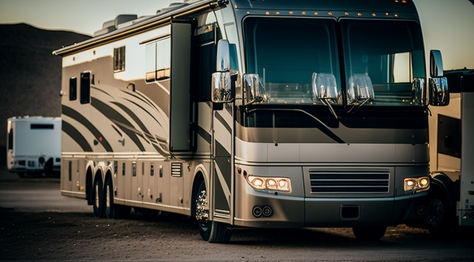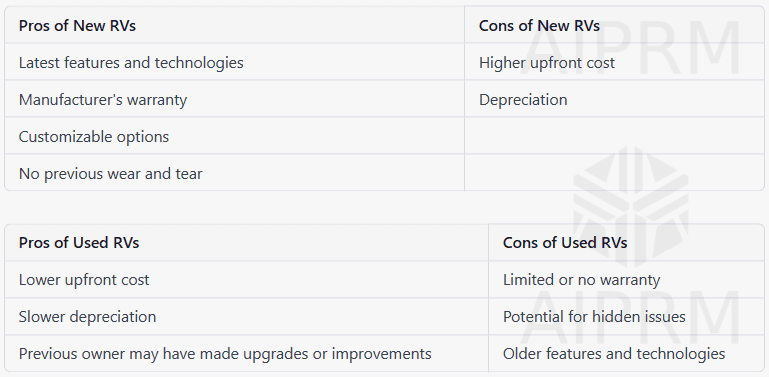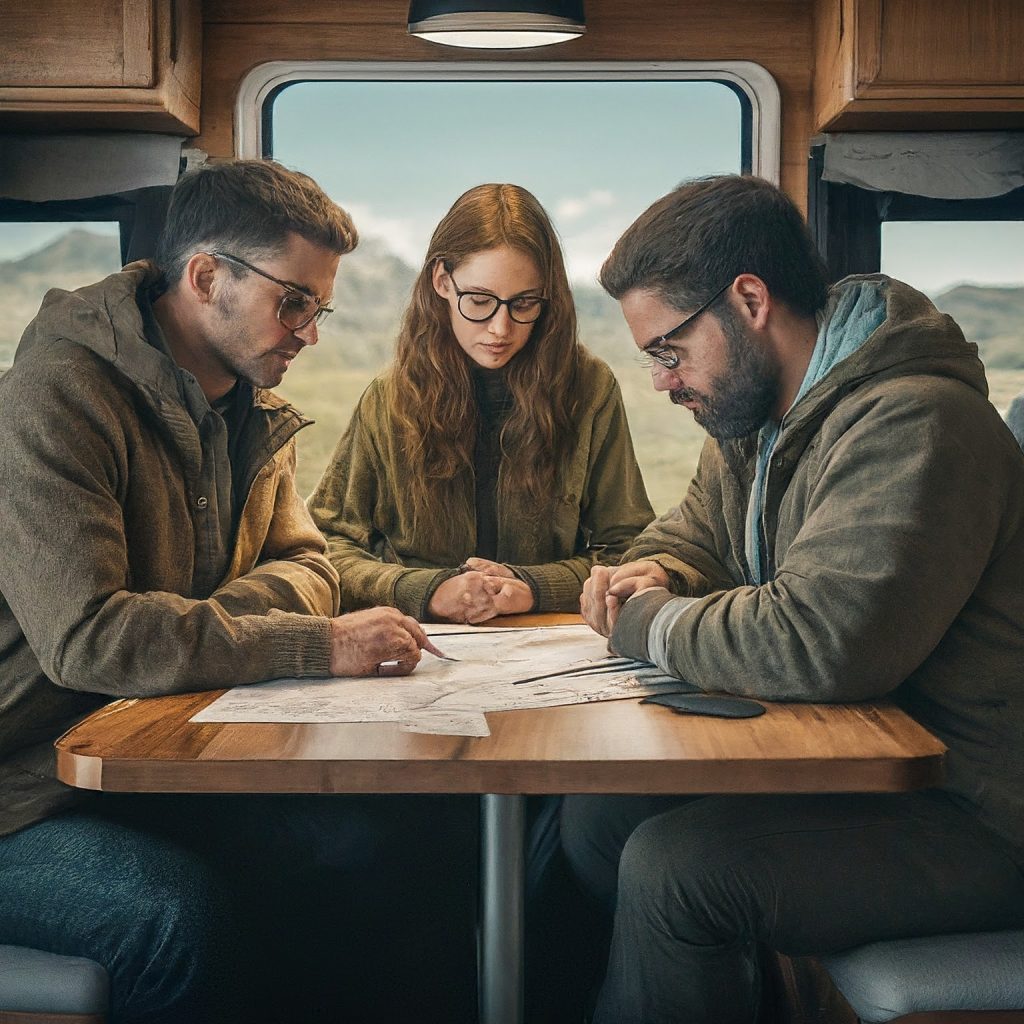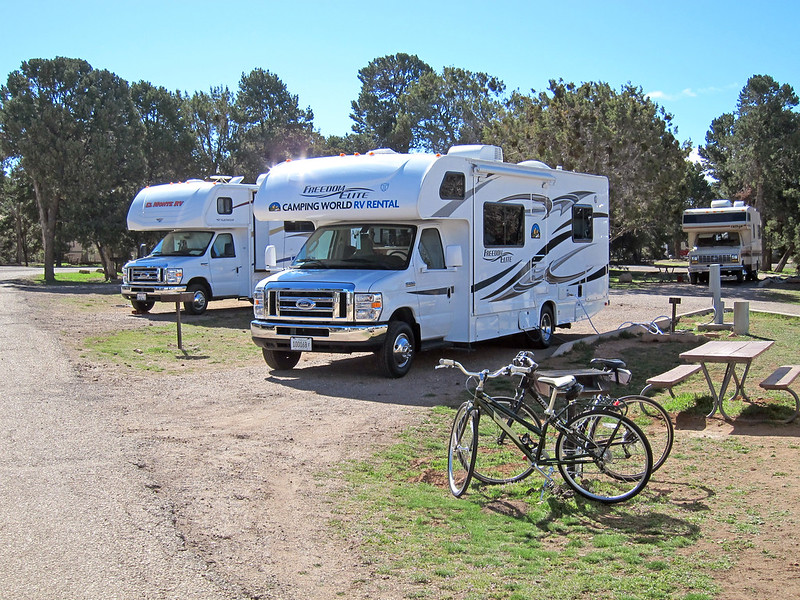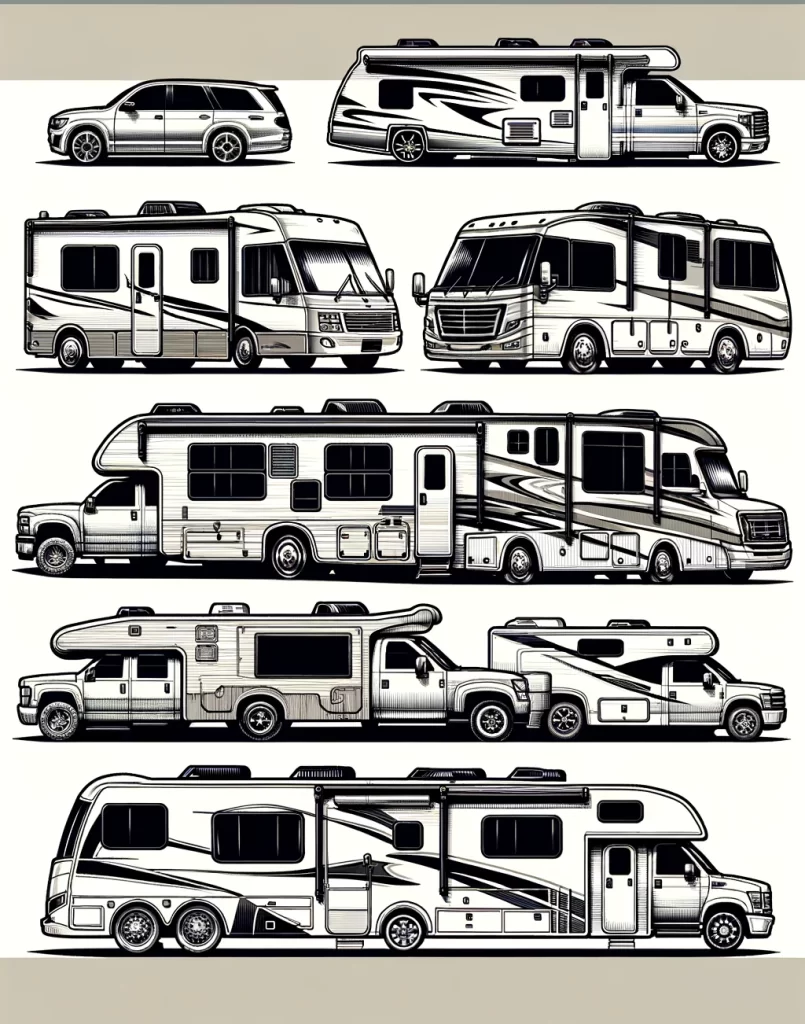Your Guide to the Ideal RV Experience
If you’re considering joining the world of RVing, you might be feeling overwhelmed by the numerous options, types, and features available. In this article, we’ll guide you through the process of shopping for and buying an RV that’s perfect for your needs and budget.
New vs. Used RVs
Before you start your search, it’s important to determine whether you want to purchase a new or used RV.
Factors to Consider When Buying an RV
There are several important factors to consider when deciding on the right RV for your needs and preferences.
- Size and Space Think about how much space you’ll need for your travels, including sleeping arrangements, storage, and living areas.
- RV Types Research the different types of RVs available, such as Class A, B, and C motorhomes, travel trailers, fifth wheels, and pop-up campers, to determine which is best for your needs.
- RV Floor Plans Examine different floor plans to find one that meets your requirements for functionality and comfort.
- Towable or Motorized RVs Determine whether you prefer a towable RV, which requires a separate vehicle for towing, or a motorized RV, which combines the living quarters and the driving component in one unit.
- Durability and Construction Quality Investigate the construction quality and materials used in the RVs you’re considering to ensure they’ll stand up to your intended use and travel conditions.
- Features and Amenities Make a list of must-have features and amenities, such as a full kitchen, bathroom, entertainment system, or solar panels, and prioritize them during your search.
Financing and Budgeting for an RV
- It’s crucial to create a budget and consider financing options before making an RV purchase.
- Determine Your Budget Establish a budget based on your financial situation, keeping in mind that the cost of an RV can range from tens of thousands to hundreds of thousands of dollars.
- Cost of Ownership Consider the ongoing costs of owning an RV, such as maintenance, fuel, insurance, registration, and campground fees, when determining your budget.
- Financing Options Explore various financing options, including loans from banks, credit unions, or specialized RV lenders, and compare interest rates and terms to find the best deal.
- Insurance and Extended Warranties Research insurance coverage and costs, and consider purchasing an extended warranty to protect your investment, especially if you’re buying a used RV.
- Depreciation and Resale Value Keep in mind that new RVs typically depreciate faster than used ones, which may affect your decision-making process. Consider the potential resale value of the RV you’re interested in, as this can impact your overall investment
RV Financing Options
RV financing is the process of borrowing money to purchase an RV. There are many different financing options available, each with its own advantages and disadvantages.
An Overview
- What is RV financing?
- RV financing is the process of borrowing money to purchase an RV.
- The money borrowed is used to pay for the RV, and the borrower agrees to repay the loan over a period of time, typically with interest.
- RV financing can be a good option for people who do not have enough money saved to purchase an RV outright.
- Why is it important to consider RV financing?
- RVs can be expensive, so financing may be necessary for many people.
- Financing can also help borrowers spread out the cost of the RV over time, making it more affordable.
- However, it is important to compare different financing options carefully before choosing one, as the terms and conditions can vary significantly.
Different types of RV financing
- Bank loans
- Bank loans are a common type of RV financing.
- Banks typically offer competitive interest rates and terms, but they may require a good credit score.
- Credit union loans
- Credit union loans can be a good option for people with good credit.
- Credit unions often offer lower interest rates than banks, but they may have more restrictive lending requirements.
- RV dealership loans
- RV dealerships often offer financing options through their own in-house lending programs.
- These programs can be a convenient option, but they may have higher interest rates than other financing options.
- Online lenders
- There are also a number of online lenders that offer RV loans.
- Online lenders typically have more flexible lending requirements than banks and credit unions, but they may also have higher interest rates.
Interest rates, terms, and fees
- Interest rates
- The interest rate is the cost of borrowing money.
- The interest rate will vary depending on the type of financing, the borrower’s credit score, and other factors.
- Terms
- The terms of a loan are the length of time it takes to repay the loan.
- The terms will vary depending on the type of financing and the borrower’s financial situation.
- Fees
- There are often fees associated with RV financing, such as origination fees and closing costs.
- It is important to factor these fees into the overall cost of the loan.
Tips for financing an RV
- Get pre-approved for a loan before you start shopping for an RV.
- This will give you an idea of how much you can afford to borrow and will help you negotiate a better price on the RV.
- Shop around for the best interest rate.
- Interest rates can vary depending on the lender, so it is important to compare rates from different lenders.
- Consider a loan with a fixed interest rate.
- This will help you budget for your monthly payments, as the interest rate will not change over the life of the loan.
- Be prepared to make a down payment.
- A down payment will lower the amount of money you need to borrow and will also lower your monthly payments.
- Ask about any available discounts or incentives.
- Some lenders offer discounts for military members, first-time RV buyers, or those who finance through their RV dealership.
RV financing can be a complex process, but it is important to do your research and compare different options carefully before choosing one. By following the tips above, you can find the best financing option for your RV purchase.
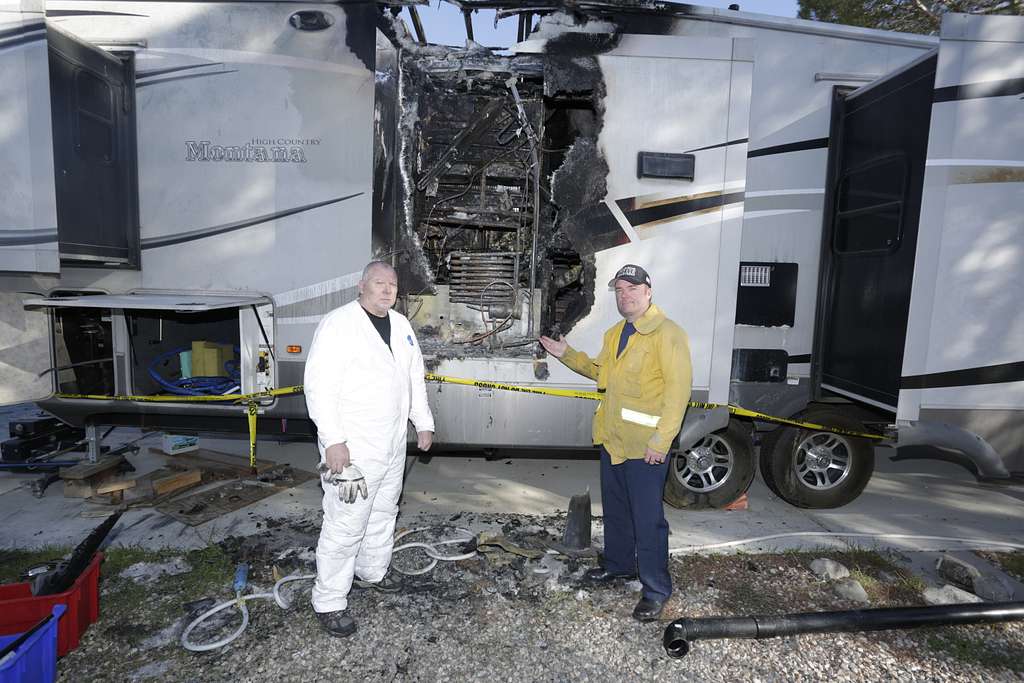
RV Insurance Coverage
RV insurance is important to protect your investment and liability in case of an accident. There are many different types of RV insurance coverage available, each with its own advantages and disadvantages.
Overview
- What is RV insurance?
- RV insurance is a type of property insurance that protects your RV from damage or theft.
- It can also provide liability coverage in case you are responsible for an accident.
- RV insurance is not required by law in most states, but it is a good idea to have it, as it can help protect you financially in the event of an accident or other loss.
Different types of RV insurance coverage
- Liability insurance
- Liability insurance covers the cost of damages you cause to others in an accident.
- This is the most important type of RV insurance to have, as it can protect you from financial ruin if you are responsible for a serious accident.
- Comprehensive insurance
- Comprehensive insurance covers damage to your RV from events other than a collision, such as fire, theft, vandalism, and falling objects.
- Collision insurance
- Collision insurance covers damage to your RV in a collision with another vehicle.
- Collision insurance typically has a deductible, which is the amount of money you are responsible for paying out of pocket in the event of a collision.
- Rental reimbursement insurance
- Rental reimbursement insurance covers the cost of renting a substitute RV if your RV is damaged or stolen.
- Medical payments insurance
- Medical payments insurance covers the cost of medical expenses for people injured in an accident involving your RV.
- Towing and labor insurance
- Towing and labor insurance covers the cost of towing your RV to a repair shop and the labor costs associated with repairs.
Tips for choosing RV insurance
- Get quotes from multiple insurers.
- The cost of RV insurance can vary significantly from insurer to insurer, so it is important to get quotes from multiple insurers before making a decision.
- Consider your needs.
- Think about the type of RV you have, how you will be using it, and your financial situation when choosing RV insurance.
- Read the policy carefully.
- Make sure you understand the terms of the policy before you sign it.
- Ask questions.
- If you have any questions about RV insurance, don’t hesitate to ask your insurer.
RV insurance can be a complex topic, but it is important to do your research and choose the right coverage for your needs. By following the tips above, you can find the best RV insurance for your peace of mind.
How to Rent an RV
Renting an RV can be a fun and exciting way to travel and explore new places. To ensure you have a smooth and enjoyable experience, it’s important to understand the rental process, insurance, and costs involved, as well as choosing the right RV for your needs. In this guide, we will discuss the following topics:
Rental Platforms and Services
There are several platforms and services available to help you rent an RV. Here are some popular options:
- Online RV rental marketplaces: Websites like Outdoorsy, RVshare, and Cruise America offer a wide selection of RVs available for rent from private owners and dealerships. You can search for an RV based on factors like location, price, size, and amenities.
- Local RV dealerships: Many RV dealerships also provide rental services. Search online or check your local Yellow Pages to find an RV dealership near you. Renting from a dealership can offer the advantage of professional support and maintenance throughout your trip.
- Peer-to-peer RV rentals: Similar to Airbnb for homes, websites like Outdoorsy and RVshare also offer peer-to-peer rental options, connecting private RV owners with renters. This can be an excellent way to find unique RVs at potentially lower prices.
Rental Insurance and Costs
Before renting an RV, it’s important to understand the associated costs and insurance requirements:
- Rental fees: The rental fee for an RV typically depends on factors like the RV’s size, age, amenities, and the duration of your trip. Be sure to budget for additional expenses like fuel, campsite fees, and any optional extras (e.g., bedding, kitchenware, etc.).
- Insurance: Most RV rental platforms and dealerships require renters to have insurance coverage. Some platforms, like Outdoorsy and RVshare, offer insurance policies directly through their websites. Alternatively, you can check with your auto insurance provider to see if they offer RV rental coverage.
- Security deposit: Renters are usually required to pay a security deposit, which is refundable if the RV is returned in good condition. The amount varies depending on the RV and rental platform, so be sure to check the specific terms and conditions.
Choosing the Right RV for Your Trip
To ensure an enjoyable experience, it’s crucial to select an RV that suits your needs and preferences:
- Size: Consider the number of people in your travel party and the amount of space you require for sleeping, cooking, and relaxing. RVs come in various sizes, from compact camper vans to large motorhomes.
- Amenities: Think about the amenities you need, such as a bathroom, kitchen, air conditioning, or heating. Also, consider any specific requirements like pet-friendliness or wheelchair accessibility.
- Driving experience: If you have never driven an RV before, you might want to start with a smaller, more manageable vehicle. Be sure to check the driving license requirements for the RV you are interested in, as some larger vehicles may require a special license.
- Budget: Set a realistic budget that includes the rental fees, insurance, fuel, campsite fees, and any additional expenses you may incur during your trip.
By considering these factors and researching your options, you can find the perfect RV for your adventure and enjoy a memorable trip.
A Tour of RV Types (or “Classes”)
Recreational vehicles (RVs) come in various shapes and sizes, each designed to cater to a specific need or preference. The following is an overview of the different types of RVs, commonly referred to as “classes”:
Class A Motorhomes
Class A motorhomes are the largest and most luxurious of the motorized RV classes. They are built on a specially designed chassis and often resemble a bus in appearance. These motorhomes offer a spacious interior with ample living space, a full kitchen, bathroom, and bedroom. They often feature high-end amenities such as slide-outs, air conditioning, and sophisticated entertainment systems. Due to their size, Class A motorhomes can be more challenging to drive and park, and they also have lower fuel efficiency compared to smaller RVs.
Class B Motorhomes
Class B motorhomes, also known as camper vans or van conversions, are the smallest and most maneuverable of the motorized RV classes. They are built on a standard full-sized van chassis, with a raised roof to provide more headroom. These compact RVs typically offer basic amenities such as a small kitchenette, a sleeping area, and a compact bathroom. Class B motorhomes are ideal for solo travelers or couples, as they are easier to drive and park and offer better fuel economy than larger motorhomes.
Class C Motorhomes
Class C motorhomes are a mid-sized option, built on a truck or van chassis with an attached cab. They usually feature a distinctive over-cab sleeping area, in addition to a living area, kitchen, and bathroom. Class C motorhomes offer more space and amenities than Class B motorhomes, while still being more manageable and fuel-efficient than Class A motorhomes. They are a popular choice for families or groups who require more space than a camper van but do not want the size and expense of a Class A motorhome.
Travel Trailers
Travel trailers are towable RVs that come in a wide range of sizes and styles. They are designed to be towed behind a vehicle, such as a truck, SUV, or even some cars, using a bumper or frame hitch. Travel trailers typically include a living area, kitchen, bathroom, and one or more sleeping areas. They offer the convenience of being detachable from the towing vehicle, which can be used for sightseeing or running errands without the need to pack up the entire RV.
Fifth Wheel Trailers
Fifth wheel trailers are a type of towable RV that is designed to be towed by a pickup truck using a special hitch mounted in the truck bed. These trailers are known for their distinctive bi-level design, with the master bedroom typically located in the raised section over the truck bed. Fifth wheel trailers offer more living space than travel trailers and often feature slide-outs and luxurious amenities. They also provide greater stability while towing, due to the hitch’s position in the truck bed.
Truck Campers
Truck campers are compact, portable living units designed to be mounted on the bed of a pickup truck. They offer basic amenities such as a sleeping area, a small kitchenette, and sometimes a compact bathroom. Truck campers are a convenient option for those who already own a pickup truck and are looking for an affordable, easy-to-drive RV option.
Pop-Up Campers
Pop-up campers, also known as folding or tent trailers, are lightweight, towable RVs that can be collapsed for easy storage and transport. They consist of a low-profile trailer base with a collapsible upper section made of canvas or other durable materials. Pop-up campers typically include basic amenities such as sleeping areas, a small kitchenette, and a dining area. Some models may also have a compact bathroom. When expanded, pop-up campers provide a comfortable camping experience with more protection from the elements than a traditional tent. They are a popular choice among those who want an affordable, easy-to-tow RV option that offers more comfort than traditional tent camping.
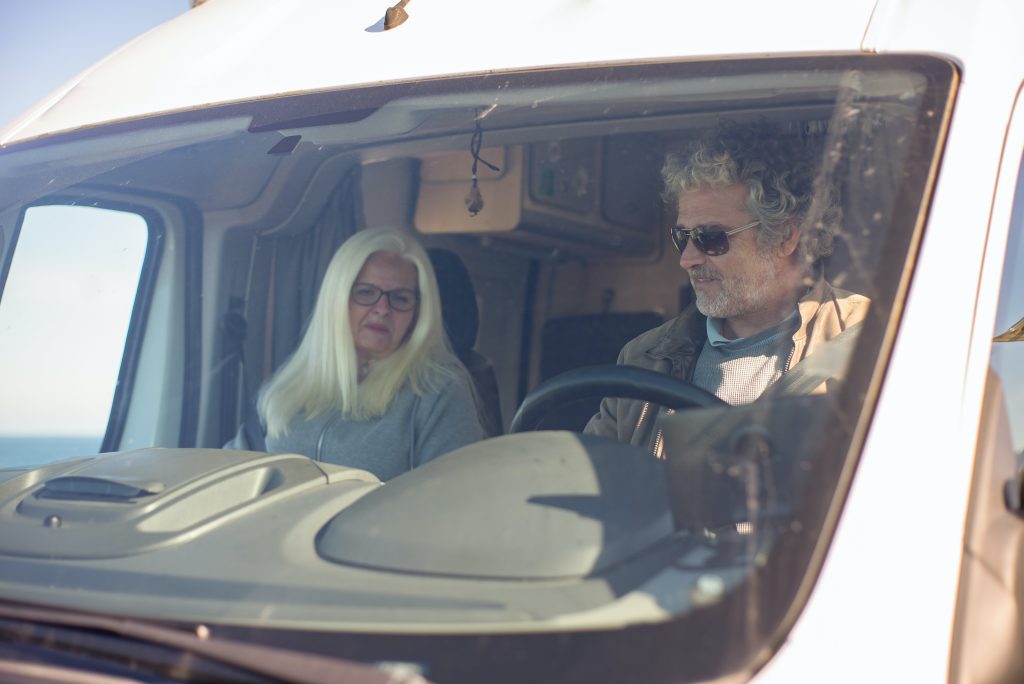
Tips for Driving and Towing an RV Safely
RVs are large and complex vehicles, so it is important to be aware of the safety risks involved in driving and towing them. Here are some tips to help you stay safe on the road:
- Get training.
- If you are new to driving or towing an RV, it is important to get training from a qualified instructor.
- Practice driving and towing in a safe environment.
- Once you have received training, it is important to practice driving and towing in a safe environment, such as an empty parking lot.
- Be aware of your surroundings.
- When driving or towing an RV, it is important to be aware of your surroundings and be prepared to take evasive action if necessary.
- Obey the speed limit.
- RVs are larger and heavier than cars, so it is important to obey the speed limit and avoid sudden braking or acceleration.
- Allow extra space when driving and towing.
- RVs take up more space on the road, so it is important to allow extra space when driving and towing.
- Be prepared to stop in a long distance.
- RVs take longer to stop than cars, so it is important to be prepared to stop in a long distance.
- Use turn signals early and often.
- When changing lanes or turning, it is important to use your turn signals early and often to alert other drivers of your intentions.
- Be aware of wind conditions.
- RVs can be affected by wind, so it is important to be aware of wind conditions and take precautions, such as slowing down or taking a wider turning radius, when necessary.
- Never drive or tow an RV if you are tired or under the influence of alcohol or drugs.
These are just a few tips for driving and towing an RV safely. By following these tips, you can help reduce the risk of accidents and injuries.
RV Campgrounds and RV-Friendly Destinations
RV campgrounds and RV-friendly destinations come in all shapes and sizes, so it is important to do your research and choose the right one for your needs. Here are some of the different types of RV campgrounds and RV-friendly destinations to consider:
- Full-service campgrounds: These campgrounds typically offer a variety of amenities, such as RV hookups, showers, laundry facilities, and dump stations. Some full-service campgrounds also offer amenities such as swimming pools, playgrounds, and game rooms.
- RV parks: RV parks are similar to full-service campgrounds, but they typically offer fewer amenities. Some RV parks may not have showers or laundry facilities.
- Boondocking sites: Boondocking sites are undeveloped campsites that do not offer any amenities. Boondocking can be a challenge, but it can also be a more affordable way to camp.
- National parks: National parks are a great place to camp if you want to enjoy the outdoors. Many national parks have RV campgrounds with a variety of amenities.
- National forests: National forests typically have less developed campgrounds than national parks, but they can be a more affordable option.
- State parks: State parks offer a variety of camping options, including RV campgrounds. State parks typically have a good balance of amenities and affordability.
When choosing an RV campground or RV-friendly destination, it is important to consider the following factors:
- Your needs: What amenities are important to you? How much are you willing to spend?
- Your RV: What size RV do you have? Do you need a site with full hookups?
- The time of year: Some campgrounds are more popular during certain times of year, so it is important to book early if you are traveling during peak season.
- The location: Where do you want to go? Some campgrounds are located in more popular tourist destinations, while others are more remote.
- Read reviews: Read reviews of different campgrounds before you book. This can help you get a sense of what other campers have experienced.
- Contact the campground: Once you have found a few campgrounds that you are interested in, contact them to ask questions. This is a good way to get more information about the campground and its amenities.
- Book early: If you are traveling during peak season, it is important to book your campground early. This will help you ensure that you get the spot you want.
Once you have considered these factors, you can start your search for the perfect RV campground or RV-friendly destination. There are many resources available to help you find the right place to camp, such as online directories, RV magazines, and travel blogs.
Conclusion
Choosing the right RV campground or RV-friendly destination can be a daunting task, but it is important to do your research and choose the right one for your needs. By considering your needs, your RV, the time of year, and the location, you can find the perfect place to camp and enjoy your RV trip.
Here are some additional tips for planning your RV trip:
- Start planning early: The earlier you start planning, the more time you will have to research destinations and campgrounds, book reservations, and get organized.
- Be flexible: Things don’t always go according to plan, so it is important to be flexible when you are traveling in an RV. Be prepared to change your plans if necessary.
- Have fun: RVing is a great way to see the country and experience new things. So relax, enjoy the journey, and make memories that will last a lifetime.
I hope this post has been helpful. If you have any further questions, please feel free to ask.
Resources
- RV Consumer Group: https://rv.org/ This nonprofit organization offers unbiased RV ratings, reviews, and buying advice, which can help your readers make informed decisions about purchasing or renting an RV.
- Go RVing: https://gorving.com/ Go RVing is a comprehensive resource for RV enthusiasts, providing information on RV types, how to choose an RV, and tips for RV travel. They offer a wealth of knowledge that can be useful.
- RVIA (Recreational Vehicle Industry Association): https://www.rvia.org/ As the national trade association representing the RV industry, RVIA provides information on industry standards, regulations, and market data.
- Good Sam: https://www.goodsam.com/ Good Sam is a well-known organization in the RV community, offering resources such as campground directories, RV insurance, and extended warranties.
- Escapees RV Club: https://www.escapees.com/ Escapees RV Club is a popular membership organization for RV enthusiasts, offering support, community, and resources for full-time and part-time RVers. They have a wealth of knowledge on various RV-related topics, including boondocking, campgrounds, and RV maintenance.
When choosing the right RV for you, consider factors such as size, amenities, ease of driving and parking, and fuel efficiency to make an informed decision.

